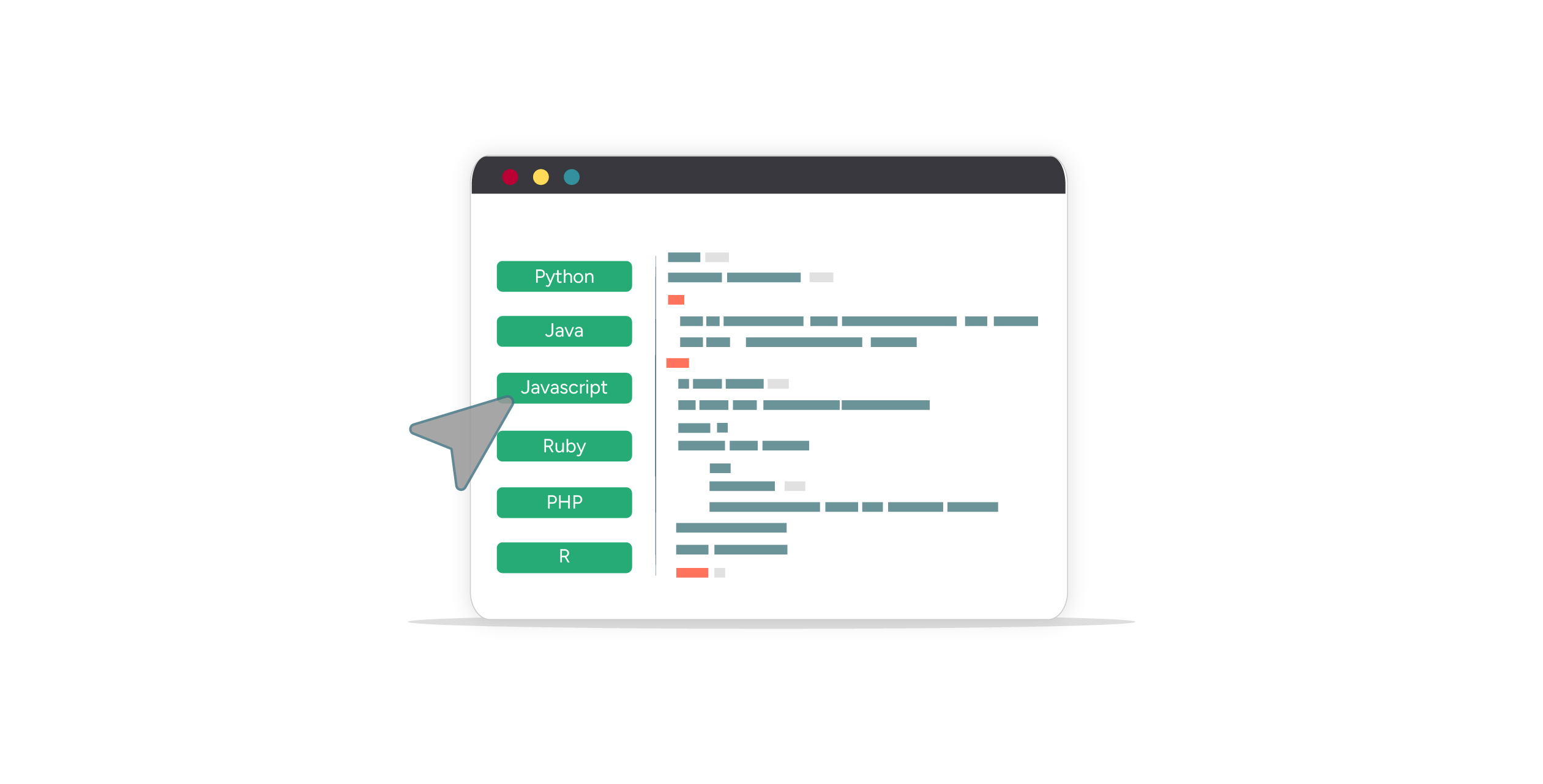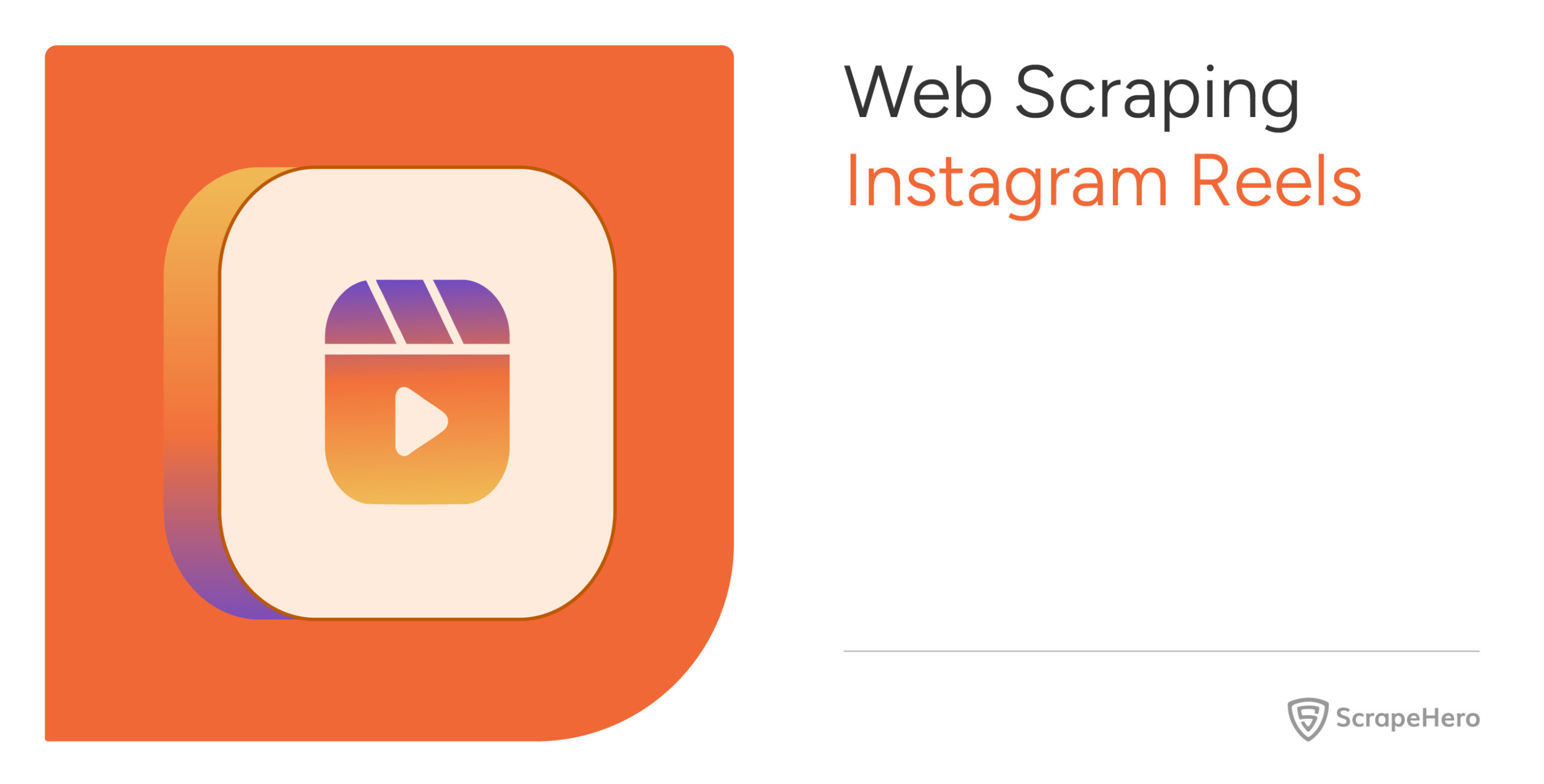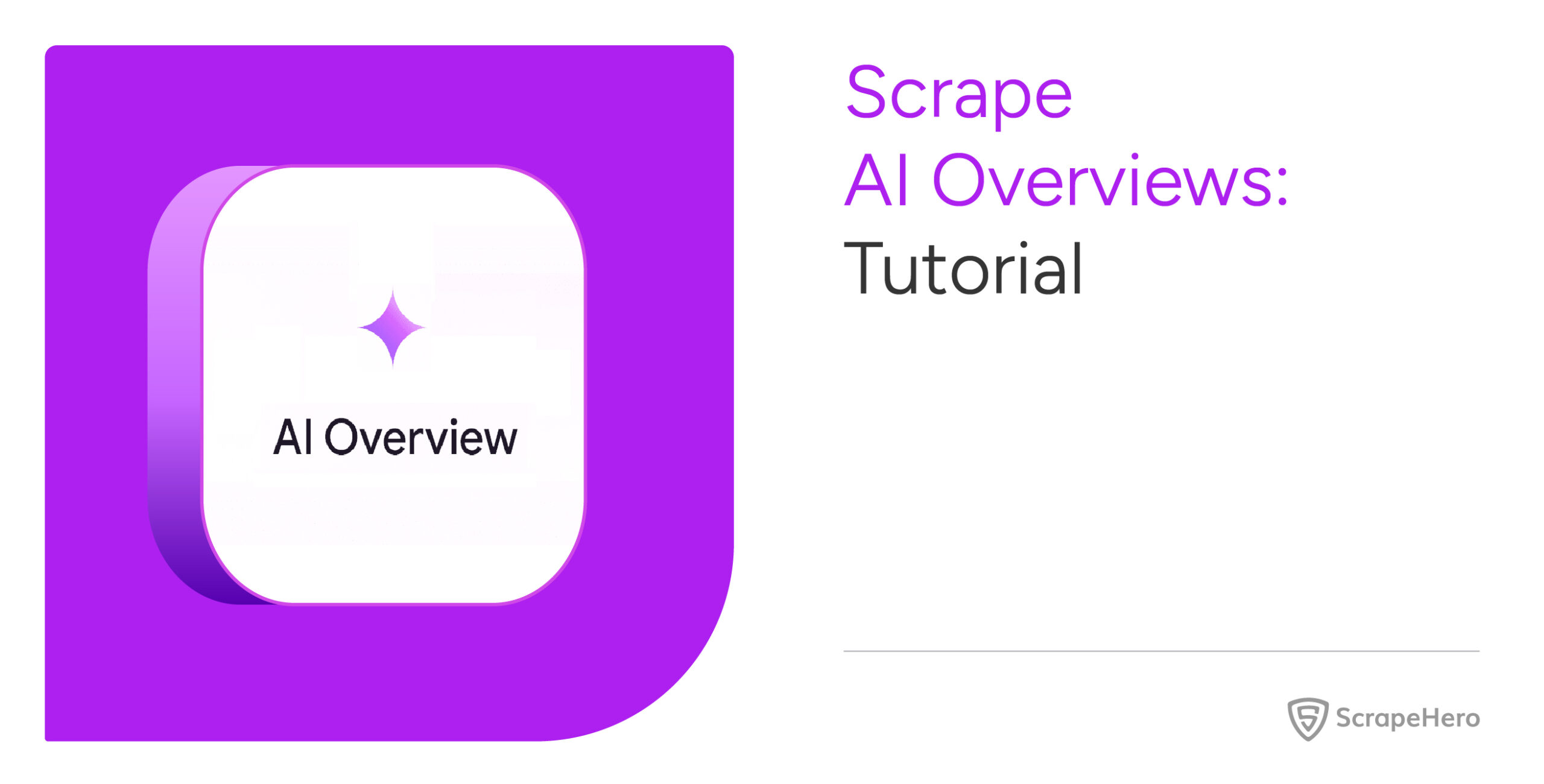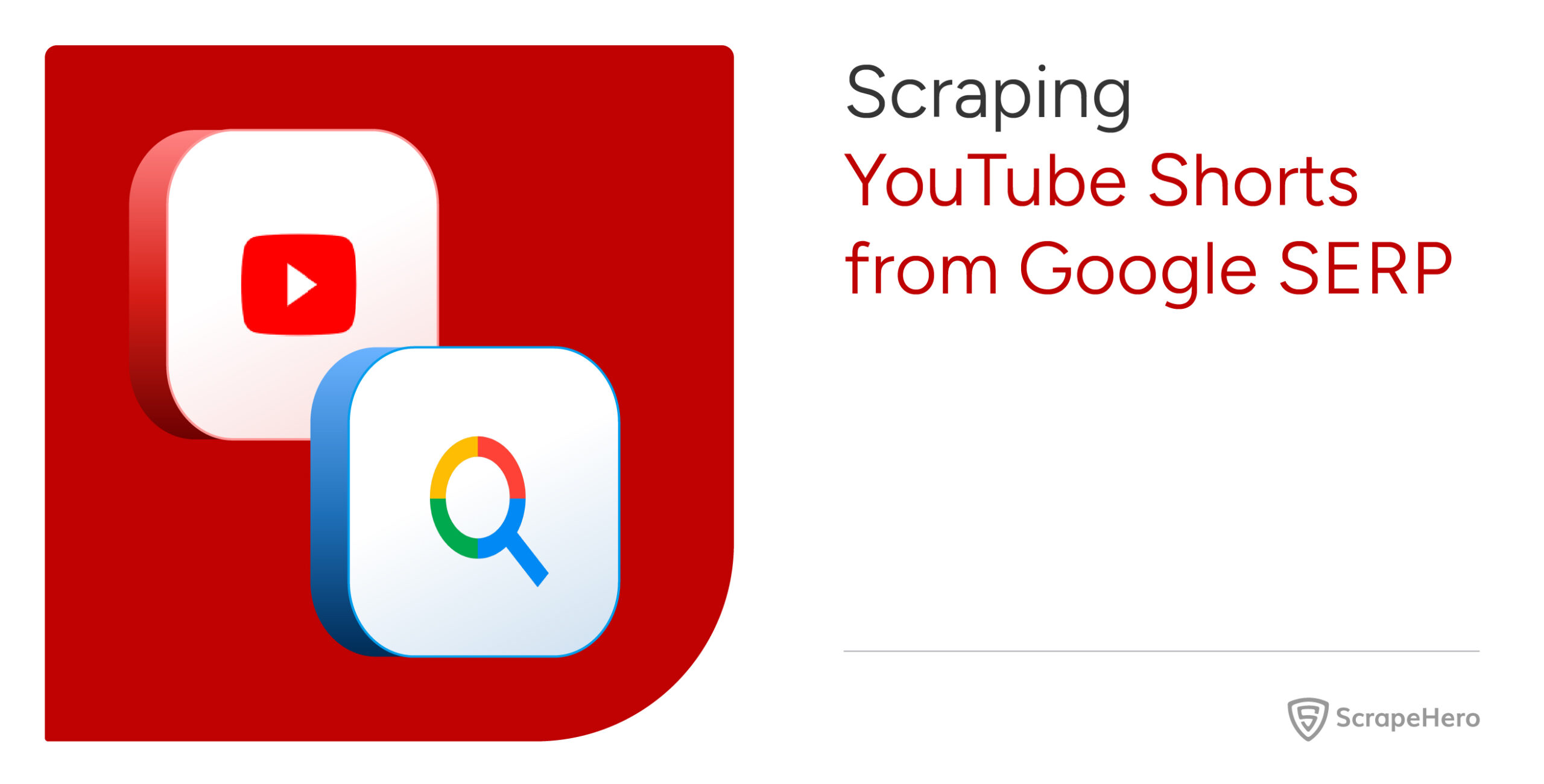You can scrape data in any programming language. However, the best programming language for web scraping depends on your project and team. The programming language must fulfill the project requirements, and your team members must be familiar with it.
Read on to learn about the best languages for web scraping and decide which suits you.
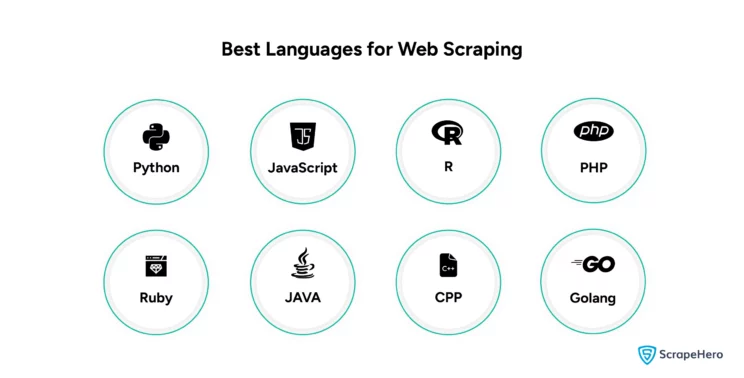
Python
Python is the most popular programming language for web scraping. It is scalable and has vast community support, which resulted in many libraries explicitly made for web scraping, including the external libraries BeautifulSoup and lxml. Its syntax, without curly brackets and semicolons, makes it loved by developers.
These characteristics make Python great for web scraping, but the numerous choices can overwhelm starting developers. Moreover, Python execution is slow.
Pros
- Readable syntax
- A large community support
- Numerous Python libraries for web scraping
- Faster Development
Cons
- Slower than compiled languages and Node.js
- Global Interpreter Lock (GIL) that makes it single-threaded for CPU-bound tasks
- Automatic memory management, while convenient, can be problematic for large-scale projects
Syntax Highlights
- Uses indentation instead of curly braces or semicolons
- Not required to declare data types explicitly
Here is a sample Python program that scrapes data from cars.com
import requests
import json
from bs4 import BeautifulSoup
response = requests.get("https://www.cars.com/shopping/results/?stock_type=all&makes%5B%5D=tesla&models%5B%5D=&maximum_distance=all&zip=")
soup = BeautifulSoup(response.text,'lxml')
cars = soup.find_all('div',{'class':'vehicle-details'})
data = []
for car in cars:
rawHref = car.find('a')['href']
href = rawHref if 'https' in rawHref else 'https://cars.com'+rawHref
name = car.find('h2',{'class':'title'}).text
data.append({
"Name":name,
"URL":href
}
)
with open('Tesla_cars.json','w',encoding='utf-8') as jsonfile:
json.dump(data,jsonfile,indent=4,ensure_ascii=False)JavaScript
JavaScript is the best language for scraping websites with dynamic content. Websites use JavaScript to display dynamic content, making programs written in JavaScript excellent for extracting such data.
JavaScript has an extensive community and includes several web-scraping libraries, like Cheerio and Axio. It also supports automated browsers like Playwright and Selenium.
The Node.js framework makes JavaScript web scraping possible, as you can run it outside the browser. Its non-blocking I/O speeds up web scraping because you can perform scraping simultaneously, enabling you to extract vast amounts of data.
However, Node.js can only handle one task at a time. Therefore, long CPU-intensive calculations can reduce responsiveness.
Pros
- Faster than Python
- Great for concurrent programming
- Excellent for scraping dynamic websites
- A large community support
Cons
- Single-threaded, which reduces responsiveness during complex calculations
- Less readable than Python
Syntax Highlights
- Uses curly brackets for function definitions
- Technically, JavaScript syntax includes semicolons; however, they are optional.
- Data types are dynamically assigned
- Requires the keyword const, var, or let for assigning variables or constants
Here is the same program in JavaScript
const axios = require('axios');
const cheerio = require('cheerio');
const url = "https://www.cars.com/shopping/results/?stock_type=all&makes%5B%5D=tesla&models%5B%5D=&maximum_distance=all&zip=";
async function fetchWebpage(url) {
try {
const response = await axios.get(url);
return response.data;
} catch (error) {
console.error("Error fetching webpage:", error);
return null;
}
}
async function extractCarData(htmlContent) {
const $ = cheerio.load(htmlContent);
const cars = $('.vehicle-details');
const carData = [];
cars.each((_, car) => {
const rawHref = $(car).find('a').attr('href');
const href = rawHref.startsWith('https') ? rawHref : `https://cars.com${rawHref}`;
const name = $(car).find('h2.title').text();
carData.push({
Name: name,
URL: href,
});
});
return carData;
}
(async () => {
const htmlContent = await fetchWebpage(url);
if (!htmlContent) {
console.error("Failed to fetch webpage content.");
return;
}
const carData = await extractCarData(htmlContent);
try {
const fs = require('fs').promises;
await fs.writeFile('Tesla_cars.json', JSON.stringify(carData, null, 4), 'utf8');
console.log("Successfully scraped Tesla car data and saved to Tesla_cars.json");
} catch (error) {
console.error("Error saving data to JSON file:", error);
}
});
Ruby
Ruby is also highly readable, similar to Python, and arguably the easiest web scraping language to learn. Its libraries, like Nokogiri, Sanitize, and Loofah, are great for parsing broken HTML.
Ruby also supports multithreading and parallel processing, but the support is weak. Its drawbacks include its speed; it is slower than node.js, PHP, and Go. It can also be slower than Python for large scale web scraping.
Ruby also suffers from a lack of popularity, making it difficult to find tutorials.
Pros
- Lots of web scraping libraries
- A large community of users
- Extremely readable
Cons
- Slower than Python
- Difficult to debug because of weak error handling capabilities
Syntax Highlights
- Ruby does not use semicolons, curly braces, or indentation
- Ruby also assigns data types dynamically at runtime
Here is a program that uses Nokogiri for data extraction.
require 'faraday'
require 'json'
require 'nokogiri'
url = "https://www.cars.com/shopping/results/?stock_type=all&makes%5B%5D=tesla&models%5B%5D=&maximum_distance=all&zip="
connection = Faraday.new(url)
response = connection.get
if response.status == 200
doc = Nokogiri::HTML(response.body)
cars = doc.search('div.vehicle-details')
data = []
cars.each do |car|
raw_href = car.at('a')['href']
href = raw_href.include?('https') ? raw_href : "https://cars.com#{raw_href}"
name = car.at('h2.title').text
car_data = {
"Name": name,
"URL": href,
}
data.push(car_data)
end
File.open('Tesla_cars.json', 'w') {|f| f.write(JSON.generate(data))}
puts "Successfully scraped Tesla car data and saved to Tesla_cars.json"
else
puts "Error fetching webpage. Status code: #{response.status}"
end
R
R is also a popular programming language with a vast community, but you can also use it for web scraping. Its vast community support means you can easily find tutorials on R. Moreover, the community mainly focuses on data analysis, making it fantastic for complex data analysis in your web scraping project.
However, it may be more challenging to learn R than Python.
Pros
- Excellent for performing data analysis on scraped data
- Decent number of web scraping packages
- High quality data visualization capabilities
Cons
- Can be slower than Python
- Steeper learning curve
- Weak error handling capabilities
Syntax Highlights
- No explicit data type declaration
- Mainly uses left facing arrow (<-) for assigning values
- Uses equal to sign (=) for equality testing
- Uses a right associative operator (%>% ) for chaining methods
library(rvest)
library(jsonlite)
library(httr)
library(stringr)
url <- "https://www.cars.com/shopping/results/?stock_type=all&makes%5B%5D=tesla&models%5B%5D=&maximum_distance=all&zip="
response <- GET(url)
content <- content(response, as = "text")
doc <- read_html(content)
cars <- doc %>%
html_elements(".vehicle-details")
data <- lapply(cars, function(car) {
rawHref <- car %>%
html_element("a.vehicle-card-link") %>%
html_attr("href")
href <- ifelse(grepl("https", rawHref), rawHref, paste0("https://cars.com", rawHref))
name <- car %>%
html_element("h2.title") %>%
html_text()
list(
"Name" = name,
"URL" = href
)
})
write(toJSON(data, auto = TRUE), file = "Tesla_cars.json")
PHP
PHP is mainly for server-side scripting; despite its vast community, few libraries exist for web scraping. However, the available ones are well established.
PHP uses the package manager ‘composer,’ which is less straightforward than Python’s pip or Node.js’s npm.
The syntax of PHP is also less intuitive than that of Python. But it would be the best programming language for web scraping for you if you are already a PHP developer.
Pros
- Large community of developers
- Few but well established web scraping libraries
Cons
- PHP has a steeper learning curve than Python
- It’s package management is also less straightforward
- Less intuitive syntax
Syntax Highlights
- PHP is also a loosely typed programming language. You don’t need to explicitly declare the types.
- Variables have a ‘$’ character in their names
- It uses the right faced arrow (->) for chaining methods
Here is a PHP code that uses the Goutte library for web scraping.
<?php use Goutte\Client; require __DIR__ . '/vendor/autoload.php'; $client = new Client(); $response = $client->request('GET','https://www.cars.com/shopping/results/?stock_type=all&makes%5B%5D=tesla&models%5B%5D=&maximum_distance=all&zip=');
$cars = $response->filter('.vehicle-details');
$data = [];
echo count( $cars );
$cars->each(function ($newcar) use(& $data) {
$car = $newcar;
$rawHref = $car->filter('a')->attr('href');
$href = (strpos($rawHref, 'https://') !== false) ? $rawHref : 'https://cars.com' . $rawHref;
echo $href,"\n";
$name = $car->filter('h2.title', 0)->text();
echo $name,"\n";
$data[] = [
"Name" => $name,
"URL" => $href,
];
echo "LOOP COMPLETED";
});
if ($data){
$jsonData = json_encode($data, JSON_PRETTY_PRINT | JSON_UNESCAPED_UNICODE | JSON_UNESCAPED_SLASHES);
file_put_contents('Tesla_cars.json', $jsonData);
echo "Data saved to Tesla_cars.json";
}
else echo "SOrry";
Java
Java is also a popular language with vast community support. However, it is not a popular choice for web scraping. Java development is slow because of its complicated nature, but it is great if your primary concern is error-free code.
Pros
- Highly scalable code
- A few but robust web scraping libraries
- Efficient multi-threading
- Vast community support
Cons
- Challenging to learn compared to Python
- Verbose syntax
- Slow development
Syntax Highlights
- JAVA is a strongly typed language; you must declare the data type explicitly.
- It uses curly brackets to contain function body and semicolons to specify the end of line
import java.io.FileWriter;
import java.io.IOException;
import java.util.ArrayList;
import java.util.List;
import org.jsoup.Jsoup;
import org.jsoup.nodes.Document;
import org.jsoup.nodes.Element;
import org.jsoup.select.Elements;
import com.fasterxml.jackson.databind.ObjectMapper;
import org.json.simple.JSONObject;
public class CarScraper {
@SuppressWarnings("unchecked")
public static void main(String[] args) throws IOException {
String url = "https://www.cars.com/shopping/results/?stock_type=all&makes%5B%5D=tesla&models%5B%5D=&maximum_distance=all&zip=";
String fileName = "Tesla_cars.json";
Document doc = Jsoup.connect(url).get();
Elements cars = doc.select("div.vehicle-details");
List carList = new ArrayList<>();
for (Element car : cars) {
String rawHref = car.select("a").attr("href");
String href = rawHref.startsWith("https") ? rawHref : "https://cars.com" + rawHref;
String name = car.select("h2.title").text();
JSONObject carData = new JSONObject();
carData.put("name",name);
carData.put("url",href);
carList.add(carData);
}
ObjectMapper mapper = new ObjectMapper();
String newCarList = mapper.writeValueAsString(carList);
try (FileWriter writer = new FileWriter(fileName)) {
writer.write(newCarList);
}
}
}
Go
Go is a relatively recent programming language developed by Google. It aims to make server development easy. However, you can use Go to extract data from the Internet. Although there isn’t a single fastest web scraping language, Go is quite fast.
It is faster than Python as it is a compiled language with a more readable syntax than other compiled languages.
Pros
- Go has a readable syntax
- It is highly scalable
- Go offers robust concurrency
- It has built-in libraries for managing HTTP requests
- It also has robust error handling methods
Cons
- It is more challenging to master than Python
- The community is quite small, although it is growing
Syntax Highlights
- Go is a strongly typed language; you must explicitly declare the data types while writing a program.
- It also has type inferences where it can infer the type of the data. A colon before the equals sign (:=) tells the compiler to use type inference.
- Go also has interface types that can store heterogeneous data structures.
- It uses curly brackets to contain the body of a function but does not use semicolons to denote the end of a statement.
package main
import (
"encoding/json"
"fmt"
"os"
"strings"
"github.com/antchfx/htmlquery"
"golang.org/x/net/html"
)
type CarData struct {
Name string `json:"Name,omitempty"`
URL string `json:"URL,omitempty"`
}
func main() {
var carsData []CarData
url := "https://www.cars.com/shopping/results/?stock_type=all&makes%5B%5D=tesla&models%5B%5D=&maximum_distance=all&zip="
doc, err := htmlquery.LoadURL(url)
print(err)
var cars []*html.Node
if doc != nil {
cars = htmlquery.Find(doc, "//div[@class='vehicle-details']")
}
var carData CarData
for _, n := range cars {
a := htmlquery.FindOne(n, "//a")
rawHref := htmlquery.SelectAttr(a, "href")
name := htmlquery.FindOne(n, "//h2[@class='title']")
carData.Name = htmlquery.InnerText(name)
if strings.Contains(rawHref, "https") {
carData.URL = rawHref
} else {
carData.URL = "https:/" + rawHref
}
carsData = append(carsData, carData)
}
jsonData, err := json.MarshalIndent(carsData, "", " ")
if err != nil {
fmt.Println("Error marshalling data to JSON:", err)
return
}
file, err := os.OpenFile("Tesla_cars.json", os.O_CREATE|os.O_WRONLY, 0644)
if err != nil {
fmt.Println("Error writing data to file:", err)
return
}
file.Write(jsonData)
}
C++
C++ is another language with complex syntax. However, it can offer faster web scraping because it is a compiled language. Moreover, you can find errors before compiling since it is a strongly typed language like GO and Java.
However, you mainly use C++, where you have to interact with the hardware, making the number of available libraries for web scraping scarce.
Pros
- Fastest programming language in this list in terms of raw speed
- A large community of developers
Cons
- Very steep learning curve
- Highly verbose, resulting in slow development
- Very few web scraping libraries
Syntax Highlights
- C++ is a strongly typed language, which requires explicit data type declarations.
- Requires you to specify namespace while declaring variables
- C++ also uses curly braces for the function body and semicolons to denote the end of the statement.
#include
#include
#include <cpr/cpr.h>
#include <nlohmann/json.hpp>
#include
// Function prototypes
nlohmann::json extract_data(GumboNode* node);
void search_for_cars(GumboNode* node, nlohmann::json& data);
std::string gumbo_get_text(GumboNode* node);
int main() {
cpr::Response r = cpr::Get(cpr::Url{ "https://www.cars.com/shopping/results/?stock_type=all&makes%5B%5D=tesla&models%5B%5D=&maximum_distance=all&zip=" });
const std::string& html = r.text;
GumboOutput* output = gumbo_parse(html.c_str());
nlohmann::json cars_data = extract_data(output->root);
std::ofstream file("Tesla_cars.json");
file << cars_data.dump(4);
file.close();
gumbo_destroy_output(&kGumboDefaultOptions, output);
std::cout << "Data extraction complete. JSON saved to 'Tesla_cars.json'." << std::endl; return 0; } nlohmann::json extract_data(GumboNode* node) { nlohmann::json data; search_for_cars(node, data); return data; } void search_for_cars(GumboNode* node, nlohmann::json& data) { if (node->type != GUMBO_NODE_ELEMENT) {
return;
}
GumboAttribute* class_attr;
if (node->v.element.tag == GUMBO_TAG_DIV &&
(class_attr = gumbo_get_attribute(&node->v.element.attributes, "class")) &&
std::string(class_attr->value).find("vehicle-details") != std::string::npos) {
nlohmann::json car_data;
GumboVector* children = &node->v.element.children;
for (unsigned int i = 0; i < children->length; ++i) {
GumboNode* child = static_cast<GumboNode*>(children->data[i]);
if (child->type == GUMBO_NODE_ELEMENT && child->v.element.tag == GUMBO_TAG_A) {
car_data["Name"] = gumbo_get_text(child);
std::cout << gumbo_get_text(child); } if (child->type == GUMBO_NODE_ELEMENT && child->v.element.tag == GUMBO_TAG_A) {
GumboAttribute* div_class = gumbo_get_attribute(&child->v.element.attributes, "href");
car_data["URL"] = "https:/"+std::string(div_class->value);
std::cout << gumbo_get_text(child); } } data.push_back(car_data); } GumboVector* children = &node->v.element.children;
for (unsigned int i = 0; i < children->length; ++i) {
search_for_cars(static_cast<GumboNode*>(children->data[i]), data);
}
}
std::string gumbo_get_text(GumboNode* node) {
if (node->type == GUMBO_NODE_TEXT) {
return std::string(node->v.text.text);
}
else if (node->type == GUMBO_NODE_ELEMENT) {
std::string text = "";
GumboVector* children = &node->v.element.children;
for (unsigned int i = 0; i < children->length; ++i) {
text += gumbo_get_text(static_cast<GumboNode*>(children->data[i]));
}
return text;
}
return "";
}
Conclusion
Technically, you can use any programming language for web scraping, but some are better due to community support and library availability.
Your expertise and project requirements are the ultimate factors in determining the best programming language for your web scraping project.
Here, you read about the eight best languages for web scraping. But Python is great if you are a beginner programmer without particular expertise in any language. The vast community, plethora of libraries, and easy-to-read syntax make it an excellent choice for beginners.
Here at ScrapeHero, we are convinced that Python is excellent for web scraping.
ScrapeHero is a full-service web scraping service provider. We can build enterprise-grade web scrapers to gather the data you need. ScrapeHero also has no-code web scrapers on ScrapeHero Cloud that you can try for free.
We can help with your data or automation needs
Turn the Internet into meaningful, structured and usable data

